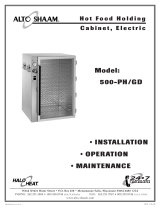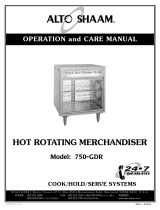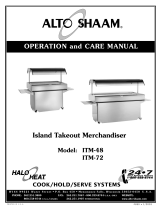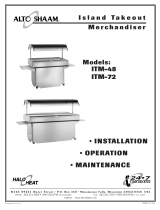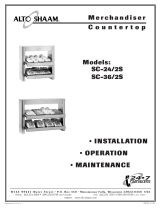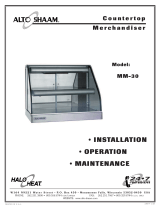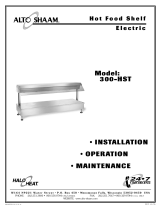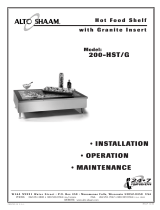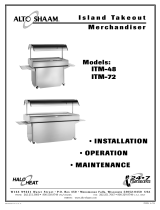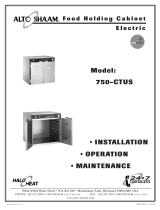Page is loading ...

#875 • 12/2005
PRINTED IN U. S . A .
INSTALLATION
OPERATION
AND
MAINTENANCE
MANUAL
COUNTERTOP
MERCHANDISER
MODEL:
SC-24/2S
SC-36/2S
W164 N9221 Water Street • P.O. Box 450 • Menomonee Falls, Wisconsin 53052-0450 USA
PHONE: 262.251.3800 • 800.558-8744 USA/CANADA FAX: 262.251.7067 • 800.329.8744 U.S.A. ONLY
WEBSITE: www.alto-shaam.com

#875 • INSTALLATION/OPERATION/SERVICE MANUAL • 1.
The Alto-Shaam appliance has been
thoroughly tested, checked for
calibration, and inspected to insure
only the highest quality unit is
provided. When you receive it,
check for any possible shipping
damage and report it at once to the
delivering carrier. See
Transportation Damage and Claims section
located in this manual.
Save all the information and instructions packed
inside with the unit. Complete and return the
warranty card to the factory as soon as possible to
assure prompt service in the event of a warranty
parts and labor claim.
Alto-Shaam heated shelf units are designed for the
purpose of maintaining hot food at a temperature
for safe consumption. The unit must be installed
on a level surface in a location that will permit the
equipment to function for its intended purpose and
allow adequate access for proper cleaning and
maintenance. Installation minimum clearance
recommendation: 3
" (76mm) from the top of unit,
and 1” (25mm) on each side.
NOTE
: Any claims for warranty must include the
full model number and serial number of
the merchandiser.
Permanent wiring or electrical outlets for this
appliance must be installed by a licensed electrician
in accordance with local, country, or national codes.
Always position the appliance so the power supply
cord is easily accessible in case of emergency.
Plug the unit into a properly grounded receptacle
ONLY. Arcing will occur when connecting or
disconnecting the unit unless all controls are in the
OFF position.
For 230V units: To prevent an electrical shock
hazard between the appliance and other appliances
or metal parts in close vicinity, an equalization-
bonding stud is provided. An equalization bonding
lead must be connected to this stud and the other
appliances / metal parts to provide sufficient
protection against potential difference. The terminal
is marked with the following symbol.
NOTE: The appliance must be connected to an
electrical circuit that is protected by an external
GFCI outlet.
Countertop Merchandiser
®
UNPACKING and SET-UP ELECTRICAL INSTALLATION
®
®
PATENT NOS.
3521030
4595247
®
PH
HEATING CHARACTERISTICS
The heated upper glass surface provides even
heat transfer to hot food in heat tested
containers that are held in direct contact with
the glass top.
ENSURE POWER SOURCE
MATCHES VOLTAGE STAMPED
ON APPLIANCE NAMEPLATE
AT NO TIME SHOULD THE INTERIOR
OR EXTERIOR BE STEAM CLEANED,
HOSED DOWN, OR FLOODED WITH
WATER OR LIQUID SOLUTION.
DO NOT USE WATER JET TO CLEAN.
SEVERE DAMAGE OR ELECTRICAL
HAZARD COULD RESULT.
WARRANTY BECOMES VOID IF
APPLIANCE IS FLOODED.

In order to maintain established National Sanitation Foundation standards, all stationary counter
and table units must be mounted on legs of a sufficient 4" (102mm) height to provide minimum
unobstructed space beneath the unit. Warranty will become null and void if these directions are
not followed.
#875 • INSTALLATION/OPERATION/SERVICE MANUAL • 2.
INSTALLATION
✧ Locate the merchandiser indoors with a normal room temperature of 68-70°F (20-21°C) in an
area where it will not be affected by constant cool air current from air conditioners, open doors
and windows, etc.
✧ The appliance must not be installed in any area where it will be affected by steam, grease,
dripping water, high temperatures, or any other severely adverse conditions.
✧ A vent is located on the top of the merchandiser. A clearance of 3" (76mm) is needed at the top
for ventilation.
Do not block this vent by covering it with utensils, signs, plates, etc.
✧ Before operating, clean the appliance with a clean, damp cloth and mild soap solution. Glass
cleaner can be used on the glass.
START-UP
36" (915mm)
2-1/2" (65mm)
11" (282mm)
23-7/16" (595mm)
41" (1044mm)
29" (737mm)
3/8" (10mm)
OUTSIDE DIMENSIONS
24" (610mm)
2-1/2" (65mm)
23-7/16" (595mm)
29" (739mm)
29" (738mm)
3
/
8
"
(
1
0
m
m
)
23-7/16" (595mm)
11" (282mm)
9" (233mm)
10-1/2" (265mm) on SC-36/2S
SC-24/2S
SC-36/2S

#875 • INSTALLATION/OPERATION/SERVICE MANUAL • 3.
OPERATION
1. Make sure the unit is connected to the
appropriate power source.
2. Press power and light switches on.
3. Turn thermostat(s) to a predetermined
number and preheat for 30 minutes.
Each shelf has its own thermostat control
numbering from 0 to 10. When the thermostat
is turned clockwise to the determined number,
the indicator light will illuminate and will remain
lit as long as the shelf is calling for heat.
The indicator light will go OUT when the
temperature on the glass top reaches the set
number determined by the operator. It will then
cycle “ON/OFF” at this holding point.
The shelves will hold a steady even heat as
assigned. The user must determine what set
point can be used regarding each food item
held on its corresponding shelf. It is
recommended that a similar food product be
placed on each shelf.
Always use the top shelf for the highest heat
assignment, and the bottom shelf for the lowest
heat assignment.
The proper temperature range for the food
being held will depend on the food type, the
packaging, and the quantity of product. When
holding food for prolonged periods, it is
advisable to periodically check the internal
temperature of each item to assure maintenance
of the proper temperature range.
4. Load prepackaged hot foods into the
merchandiser.
Before loading food into the unit, use a pocket-
type meat thermometer to make certain all
products have reached an internal temperature
of 160° F (71°C) or higher. If any food product
is not at proper serving temperature, use a Halo
Heat cooking and holding oven or Combitherm
Oven to bring the product within the correct
temperature range.
Keep hot foods looking fresh. Occasionally stir or
rotate foods as needed. Wipe spills immediately
to assure maximum eye appeal and minimize end-
of-the-day cleanup.
✧ Do not allow liquids or food to come in direct contact with the glass shelves.
✧ Use hand protection when handling hot items.
✧ Be certain only hot foods in appropriate heat tested containers are used.
Be careful not to overheat as this may cause some containers to melt.
✧ It is recommended that plastic or paper containers be used.
Pans or dishes will scratch the glass.
✧ Do not stack containers.
✧ A clearance of 3" (76mm) is needed at the top of the unit for ventilation.
Do not block the top vent by covering it with utensils, signs, plates, etc.
To avoid personal injury and damage to the unit –– treat glass with care.
Remember –– glass can shatter.
ON/OFF switch LIGHT switch bottom shelf top shelf

OPERATION
Chefs, cooks and other
specialized food service
personnel employ
varied methods of
cooking. Proper
holding temperatures
for a specific food
product must be based
on the moisture content
of the product, product
density, volume, and
proper serving
temperatures. Safe
holding temperatures
must also be correlated
with palatability in
determining the length
of holding time for a
specific product.
Halo Heat maintains
the maximum amount
of product moisture
content without the
addition of water, water
vapor, or steam.
Maintaining maximum
natural product
moisture preserves the
natural flavor of the
product and provides a
more genuine taste. In
addition to product
moisture retention, the
gentle properties of
Halo Heat maintain a
consistent temperature
throughout the cabinet
without the necessity of
a heat distribution fan,
thereby preventing further
moisture loss due to
evaporation or dehydration.
When product is removed
from a high temperature
cooking environment for
immediate transfer into
equipment with the lower
temperature required for
hot food holding,
condensation can form on
the outside of the product
and on the inside of
plastic containers used in
self-service applications.
Allowing the product to
release the initial steam
and heat produced by high
temperature cooking can
alleviate this condition.
To preserve the safety and
quality of freshly cooked
foods, however, a
maximum of 1 to 2
minutes must be the only
time period allowed for
the initial heat to be
released from the product.
This appliance is equipped
with a thermostat
indicating a range of
between 0 and 10.
Use a metal-stemmed
thermometer to measure
the internal temperature
of the product(s) being
held.
Adjust the thermostat
setting to achieve the best
overall setting based on
internal product
temperature.
HOLDING TEMPERATURE RANGE
MEAT FAHRENHEIT CELSIUS
BEEF ROAST — Rare 140°F60°C
BEEF ROAST — Med/Well Done 160°F71°C
BEEF BRISKET 160°— 175°F71°— 79°C
CORN BEEF 160°— 175°F71°— 79°C
PASTRAMI 160°— 175°F71°— 79°C
PRIME RIB — Rare 140°F60°C
STEAKS — Broiled/Fried 140°— 160°F60°— 71°C
RIBS — Beef or Pork 160°F71°C
VEAL 160°— 175°F71°— 79°C
HAM 160°— 175°F71°— 79°C
PORK 160°— 175°F71°— 79°C
LAMB 160°— 175°F71°— 79°C
POULTRY
CHICKEN — Fried/Baked 160°— 175°F71°— 79°C
DUCK 160°— 175°F71°— 79°C
TURKEY 160°— 175°F71°— 79°C
GENERAL 160°— 175°F71°— 79°C
FISH/SEAFOOD
FISH — Baked/Fried 160°— 175°F71°— 79°C
LOBSTER 160°— 175°F71°— 79°C
SHRIMP — Fried 160°— 175°F71°— 79°C
BAKED GOODS
BREADS/ROLLS 120°— 140°F49°— 60°C
MISCELLANEOUS
CASSEROLES 160°— 175°F71°— 79°C
DOUGH — Proofing 80°— 100°F27°— 38°C
EGGS —Fried 150°— 160°F66°— 71°C
FROZEN ENTREES 160°— 175°F71°— 79°C
HORS D'OEUVRES 160°— 180°F71°— 82°C
PASTA 160°— 180°F71°— 82°C
PIZZA 160°— 180°F71°— 82°C
POTATOES 180°F82°C
PLATED MEALS 180°F82°C
SAUCES 140°— 200°F60°— 93°C
SOUP 140°— 200°F60°— 93°C
VEGETABLES 160°— 175°F71°— 79°C
The holding temperatures listed are suggested guidelines only.
GENERAL HOLDING GUIDELINES
#875 • INSTALLATION/OPERATION/SERVICE MANUAL • 4.

#875 • INSTALLATION/OPERATION/SERVICE MANUAL • 5.
CARE and CLEANING
PROTECTING STAINLESS STEEL
SURFACES
It is important to guard
against corrosion in the care
of stainless steel surfaces.
Harsh, corrosive, or
inappropriate chemicals can completely destroy
the protective surface layer of stainless steel.
Abrasive pads, steel wool, or metal implements
will abrade surfaces causing damage to this
protective coating and will eventually result in
areas of corrosion. Even water, particularly hard
water that contains high to moderate
concentrations of chloride, will cause oxidation
and pitting that result in rust and corrosion. In
addition, many acidic foods spilled and left to
remain on metal surfaces are contributing factors
that will corrode surfaces.
Proper cleaning agents, materials, and
methods are vital to maintaining the appearance
and life of this appliance. Spilled foods should
be removed and the area wiped as soon as
possible but at the very least, a minimum of once
a day. Always thoroughly rinse surfaces after
using a cleaning agent and wipe standing water
as quickly as possible after rinsing.
CLEANING AGENTS
Use non-abrasive cleaning products designed for use
on stainless steel surfaces. Cleaning agents must be
chloride-free compounds and must not contain
quaternary salts. Never use hydrochloric acid
(muriatic acid) on stainless steel surfaces. Always
use the proper cleaning agent at the manufacturer's
recommended strength. Contact your local cleaning
supplier for product recommendations.
CLEANING MATERIALS
The cleaning function can
usually be accomplished
with the proper cleaning
agent and a soft, clean cloth.
When more aggressive methods
must be employed, use a non-
abrasive scouring pad on difficult
areas and make certain to scrub with the visible
grain of surface metal to avoid surface scratches.
Never use wire brushes, metal scouring pads, or
scrapers to remove food residue.
CLEANING AND PREVENTIVE MAINTENANCE
TO PROTECT STAINLESS STEEL SURFACES, COMPLETELY
AVOID THE USE OF ABRASIVE CLEANING COMPOUNDS,
CHLORIDE BASED CLEANERS, OR CLEANERS CONTAINING
QUATERNARY SALTS. NEVER USE HYDROCHLORIC ACID
(MURIATIC ACID) ON STAINLESS STEEL.
CAUTION

#875 • INSTALLATION/OPERATION/SERVICE MANUAL • 6.
1. Disconnect the appliance from power source,
and let cool.
2. Do not clean the glass when hot.
The glass should be washed
regularly with fresh warm
water, a mild detergent, and
a clean, non-abrasive cloth.
Glass cleaner can be used.
.
3. To help maintain the protective film coating on
any polished
stainless steel, clean the
exterior of the unit with a cleaner
recommended for stainless steel surfaces.
Spray the cleaning agent on a cloth and wipe
with the grain of the stainless steel.
4. Avoid the use of abrasive cleaning compounds,
chloride based cleaners, or cleaners containing
quaternary salts on stainless steel. Never
use hydrochloric acid (muriatic acid) on
stainless steel.
CARE and CLEANING
The cleanliness and appearance of this appliance will contribute
considerably to operating efficiency and savory, appetizing food.
Good equipment kept clean works better and lasts longer.
THOROUGHLY CLEAN THE APPLIANCE DAILY
Always follow appropriate state or local health (hygiene) regulations regarding
all applicable cleaning and sanitation requirements
for foodservice equipment.
DISCONNECT UNIT FROM
POWER SOURCE BEFORE
CLEANING OR SERVICING.
AT NO TIME SHOULD THE INTERIOR
OR EXTERIOR BE STEAM CLEANED,
HOSED DOWN, OR FLOODED WITH
WATER OR LIQUID SOLUTION.
DO NOT USE WATER JET TO CLEAN.
SEVERE DAMAGE OR ELECTRICAL
HAZARD COULD RESULT.
WARRANTY BECOMES VOID IF
APPLIANCE IS FLOODED.

#875 • INSTALLATION/OPERATION/SERVICE MANUAL • 7.
Food flavor and aroma are usually so closely
related that it is difficult, if not impossible, to
separate them. There is also an important,
inseparable relationship between cleanliness and
food flavor. Cleanliness, top operating efficiency,
and appearance of equipment contribute
considerably to savory, appetizing foods. Good
equipment that is kept clean, works better and
lasts longer.
Most food imparts its own particular aroma and
many foods also absorb existing odors.
Unfortunately, during this absorption, there is no
distinction between GOOD and BAD odors. The
majority of objectionable flavors and odors
troubling food service operations are caused by
bacteria growth. Sourness, rancidity, mustiness,
stale or other OFF flavors are usually the result of
germ activity.
The easiest way to insure full, natural food flavor
is through comprehensive cleanliness. This means
good control of both visible soil (dirt) and invisible
soil (germs). A thorough approach to sanitation
will provide essential cleanliness. It will assure an
attractive appearance of equipment, along with
maximum efficiency and utility. More importantly,
a good sanitation program provides one of the key
elements in the prevention of food-borne illnesses.
A controlled holding environment for prepared
foods is just one of the important factors involved
in the prevention of food-borne illnesses.
Temperature monitoring and control during
receiving, storage, preparation, and the service of
foods are of equal importance.
The most accurate method of measuring safe
temperatures of both hot and cold foods is by
internal product temperature. A quality
thermometer is an effective tool for this purpose,
and should be routinely used on all products that
require holding at a specific temperature.
A comprehensive sanitation program should focus
on the training of staff in basic sanitation
procedures. This includes personal hygiene,
proper handling of raw foods, cooking to a safe
internal product temperature, and the routine
monitoring of internal temperatures from receiving
through service.
Most food-borne illnesses can be prevented
through proper temperature control and a
comprehensive program of sanitation. Both these
factors are important to build quality service as the
foundation of customer satisfaction. Safe food
handling practices to prevent food-borne illness is
of critical importance to the health and safety of
your customers. HACCP, an acronym for Hazard
Analysis (at) Critical Control Points, is a quality
control program of operating procedures to assure
food integrity, quality, and safety. Taking steps
necessary to augment food safety practices are
both cost effective and relatively simple. While
HACCP guidelines go far beyond the scope of this
manual, additional information is available by
contacting:
Center for Food Safety and Applied Nutrition
Food and Drug Administration
1-888-SAFEFOOD
SANITATION
INTERNAL FOOD PRODUCT TEMPERATURES
HOT FOODS
DANGER ZONE 40° TO 140°F(4° TO 60°C)
CRITICAL ZONE 70° TO 120°F (21° TO 49°C)
SAFE ZONE 140° TO 165°F (60° TO 74°C)
COLD FOODS
DANGER ZONE ABOVE 40°F (ABOVE 4°C)
SAFE ZONE 36°F TO 40°F(2°C TO 4°C)
FROZEN FOODS
DANGER ZONE ABOVE 32°F (ABOVE 0°C)
CRITICAL ZONE 0° TO 32°F (-18° TO 0°C)
SAFE ZONE 0°F
OR BELOW (-18°C OR BELOW)

Part Number
Description SC-24 SC-36
Side panel 1003312 1003312
Top cover 1003885 1003313
Guard, front shelf 1003880 1003319
Control BA-26247 BA-26247
Power Supply BA-33554 BA-33554
Terminal Block BK-3019 BK-3019
Thermister block, shelf BK-33546 BK-33546
Cord Bushing BU-3964 BU-3964
Cordset, 12/3 SJO, 20A-125V plug CD-3397 CD-3397
Cordset, Euro CEE, 7/7 HO7RN-FCG2, 230V CD-33882 CD-33882
Circuit breaker, GFCI, 20 Amp CI-34157 CI-34157
Rubber foot pad DR-2969 DR-2969
Fan FA-3973 FA-3973
Fan, 230V FA-3974 FA-3974
Glass shelf, heated GL-26340 GL-26512
Glass shelf, heated, 230V GL-26549 GL-26212
Control Knob KN-26290 KN-26290
Lamp ballast LP-34135 LP-34135
Lamp ballast, 230V LP-34123 LP-34123
Lamp bulb LP-34151 LP-34156
Lamp bulb, 230V LP-33822 LP-33822
Panel Overlay PE-26096 PE-26096
Lamp receptacle RP-34160 RP-34160
Ground Screw SC-2190 SC-2190
Switch, rocker SW-3887 SW-3887
Divider bars, optional
CONTACT FACTORY CONTACT FACTORY
#875 • INSTALLATION/OPERATION/SERVICE MANUAL • 8.
SERVICE
Repairs should be made by authorized
service agents only.
Disconnect appliance from power source
before cleaning or servicing.

#875 • INSTALLATION/OPERATION/SERVICE MANUAL • 9.
SERVICE
GFCI Breaker
CI-34157
Side Cover
1003312
Top Cover
1003313 for SC-36
1003885 for SC-24
Control Knobs
KN-26290
Power & Light Switches
SW-3887
Panel Overlay
PE-26096
Identification Tag
SC-36/2S
Operator Side
Rubber
Foot Pad
DR-2969
DISCONNECT UNIT FROM
POWER SOURCE BEFORE
CLEANING OR SERVICING.

#875 • INSTALLATION/OPERATION/SERVICE MANUAL • 10.
SERVICE
Bushing
BU-3964
Control
BA-26247
Fan
FA-3973
FA-3974, 230V
Control
BA-26247
Power & Light Switches
SW-3887
Power Supply
BA-33554
Ballast
LP-34135
LP-34123, 230V
Glass Shelf
SC-36: GL-26512
GL-26212, 230V
SC-24: GL-26340
GL-26549, 230V
Terminal Block
BK-3019
Cord Bushing
BU-3964
Cord
CD-3397
Shelf Guard
1003319 for SC-36
1003380 for SC-24
Lamp Bulb
SC-36: LP-34156
LP-33822, 230V
SC-24: LP-34151
LP-33822, 230V
Receptacle
RP-34160
Lamp Bulb
SC-36: LP-34156
LP-33822, 230V
SC-24: LP-34151
LP-33822, 230V
Receptacle
RP-34160
SC-36/2S
with top panel removed
SC-36/2S
with side
panel removed

#875 • INSTALLATION/OPERATION/SERVICE MANUAL • 11.

#875 • INSTALLATION/OPERATION/SERVICE MANUAL • 12.

#875 • INSTALLATION/OPERATION/SERVICE MANUAL • 13.

#875 • INSTALLATION/OPERATION/SERVICE MANUAL • 14.

W164 N9221 Water Street • PO Box 450 • Menomonee Falls, Wisconsin 53052-0450 • USA
Phone: 262.251.3800 800.558.3744 USA/Canada • Fax: 262.251.7067 800.329.3744 USA/Canada
website: www.alto-shaam.com
Date Installed:Model Number:
All Alto-Shaam
equipment is sold
F.O.B. shipping point,
and when accepted by
the carrier, such
shipments become
TRANSPORTATION
DAMAGE and CLAIMS
LIMITED
WARRANTY
the property of the consignee.
Should damage occur in shipment, it is a matter between
the carrier and the consignee. In such cases, the carrier is
assumed to be responsible for the safe delivery of the
merchandise, unless negligence can be established on the
part of the shipper.
1. Make an immediate inspection while the equipment is
still in the truck or immediately after it is moved to the
receiving area. Do not wait until after the material is
moved to a storage area.
2. Do not sign a delivery receipt or a freight bill until you
have made a proper count and inspection of all
merchandise received.
3. Note all damage to packages directly on the carrier’s
delivery receipt.
4. Make certain the driver signs this receipt. If he refuses to
sign, make a notation of this refusal on the receipt.
5. If the driver refuses to allow inspection, write the following
on the delivery receipt:
6. Telephone the carrier’s office immediately upon finding
damage and request an inspection. Mail a written
confirmation of the time, date, and the person called.
7. Save any packages and packing material for further
inspection by the carrier.
8. Promptly file a written claim with the carrier and attach
copies of all supporting paperwork.
We will continue our policy of assisting our customers in
collecting claims which have been properly filed and actively
pursued. We cannot, however, file any damage claims for
you, assume the responsibility of any claims, nor accept
deductions in payment for such claims.
Alto-Shaam, Inc. warrants to the original purchaser that any
original part that is found to be defective in material or
workmanship will, at our option, subject to provisions hereinafter
stated, be replaced with a new or rebuilt part.
The labor warranty remains in effect one (1) year from installation
or fifteen (15) months from the shipping date, whichever occurs first.
Alto-Shaam will bear normal labor charges performed during standard
business hours not subject to overtime, holiday rates or any additional fees.
The parts warranty remains in effect one (1) year from installation
or fifteen (15) months from the shipping date, whichever occurs first.
A. Halo Heat cook/hold ovens include a five (5) year parts
warranty on the heating element. Labor will be covered under
the terms of the standard warranty period of one (1) year or
fifteen (15) months.
B. Alto-Shaam Quickchillers include a five (5) year parts warranty
on the refrigeration compressor. Labor will be covered under
the terms of the standard warranty period of one (1) year or
fifteen (15) months.
1. Calibration.
2. Replacement of light bulbs and/or the replacement of display
case glass due to damage of any kind.
3. Equipment damage caused by accident, shipping, improper
installation or alteration.
4. Equipment used under conditions of abuse, misuse, carelessness
or abnormal conditions including equipment subjected to harsh
or inappropriate chemicals including but not limited to
compounds containing chloride or quaternary salts, poor
water quality, or equipment with missing or altered
serial numbers.
5. Any losses or damage resulting from malfunction, including
loss of product or consequential or incidental damages of
any kind.
6. Equipment modified in any manner from original model,
substitution of parts other than factory authorized parts,
removal of any parts including legs, or addition of any parts.
This warranty is exclusive and is in lieu of all other warranties,
expressed or implied, including the implied warranties of
merchantability and fitness for purpose. In no event shall the
Company be liable for loss of use, loss of revenue, or loss of
product or profit, or for indirect or consequential damages.
This warranty is in lieu of all other warranties expressed or
implied and Alto-Shaam, Inc. neither assumes or authorizes any
persons to assume for it any other obligation or liability in
connection with Alto-Shaam equipment.
ALTO-SHAAM, INC.
Warranty effective October 1, 2005
Exceptions to the one year part warranty period are as listed:
This warranty does not apply to:
RECORD THE MODEL AND SERIAL NUMBER OF THE APPLIANCE FOR EASY REFERENCE.
ALWAYS REFER TO BOTH MODEL AND SERIAL NUMBER IN ANY CONTACT WITH ALTO-SHAAM REGARDING THIS APPLIANCE.
Driver refuses to allow inspection
of containers for visible damage.
Voltage:
Serial Number:
Purchased From:
/
